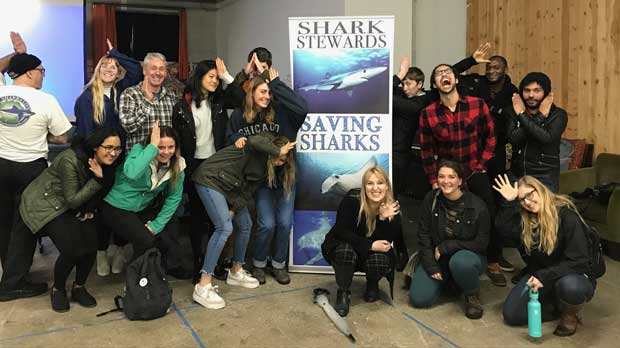
By Priscilla Rodriguez and Alexandra Fradelizio | m/Oppenheim.Org Writers
Every year, more than 70 million sharks worldwide are killed for their fins, which are then traded for thousands of dollars, contributing to a multimillion-dollar industry.

The obsession with shark finning, which is the act of cutting off the fins from a shark and discarding the body back into the ocean (sometimes while the animal is still alive), stems from the steep economic incentive for poachers to make $300 per pound of shark fin, or upwards of $50,000 for one Basking Shark fin.
But this practice, which may have once been “sustainable” when only a few people were doing it, has now become a widespread and wasteful practice that has led to the steady decline of shark populations around the world.
Today, more than 30 percent of sharks are highly endangered or near extinction, according to data from Shark Stewards, a nonprofit based in the San Francisco Bay Area that works to protect the ocean and its sharks by establishing shark sanctuaries and championing legislation to end the shark fin trade.
Since 2006, Shark Stewards has worked to end this harsh practice that is harmful to not only the ocean’s ecosystem but also to the entire planet.
Whether you live near the ocean or hundreds of miles away from it, “we all rely on the ocean for climate [and] food, and having a healthy planet… is critical for the health of the human race,” says David McGuire MPH, Director and Founder of Shark Stewards.
McGuire first learned about the severity of the shark fin trade industry when he was on a diving expedition in the French Polynesia where he observed a finned shark and a field of freshly cut shark fins lined on a ship.
“It was not illegal at the time,” he explained, “and I learned about how grave this problem was, and no one was doing anything about it.”
McGuire quit his job at Berkeley’s biology department and set out to create a documentary to highlight the issue.
Though the shark fin trade is illegal in many places now thanks to the international work of organizations like Shark Stewards, which was the first to introduce shark fin trade bans in the U.S. in 2011, the industry is still very much alive and continues to slowly consume shark populations around the world.
McGuire explains that in various regions of the world, people will pay thousands of dollars for shark fins which are considered a delicacy and a sign of prosperity. But especially in regions of Asia, China specifically, the problem is tenfold.

He says that in China, shark fins were once (and still are) associated with “wealth, honor, and generosity and associated with economics.”
Shark Stewards has navigated complexities to find a way to make this issue resonate with people from all regions of the world while also finding a way to make sure that it doesn’t become an issue of race.
One of the biggest challenges in working in the shark fin trade and exotic wildlife trade is maneuvering the complications that come with trying to raise awareness on an issue that is largely driven by consumers of one race, while the organization is led by a “white guy” based in the U.S., explains McGuire.
“The consumers are primarily Chinese, and we encountered early on racial tensions that we were discriminating against Chinese individuals – which is not true,” he says.
Getting people to understand that this is not a race issue, but one of inadequate education on why it is detrimental to the ocean and the environment, and one of finding room to shed light on an issue that is highly overlooked, is a major challenge. But it’s important that everyone is aware of the issue and aware of what they are consuming.
In many cases, Chinese consumers don’t actually know that shark fins are from a shark, McGuire explains, because the translation of the Chinese term for shark fin is “fish wing.” This may lead some to believe that they are just consuming any fin from a variety of fish, or they simply aren’t aware how the high demand is wreaking havoc on the oceans.
Over the last 13 years, Shark Stewards has helped to establish shark fin trade bans in various regions of the U.S. and Canada and has raised awareness on the issue all over the world through staff and volunteers, which have been essential in the organization’s mission.
Shark Stewards has helped to push legislation to protect oceans and their ecosystems and at the same time has educated thousands of people on how they can help and why the work that they are doing is important for the present and future.
Today, the organization has more than a thousand leaders around the world working to bring the issue to the forefront and also has reached more than 10,000 youths and adults in the Bay Area to educate them on the importance of sharks in the ecosystem through school and public programs.

As an apex predator, sharks are majestic and powerful creatures that have very few natural predators in the ocean and therefore is important for regulating biodiversity and maintaining the ocean’s rich ecosystem. Without it, the ocean’s health could be in jeopardy.
Once people can begin to understand the importance of these creatures, rather than fear them, they will hopefully want to protect them, explains McGuire, and that is exactly what Shark Stewards is working toward.
Every year, for example, the organization hosts “Sharktober Fest” in October to celebrate the annual return of the great white sharks to the shark sanctuary off the coast of San Francisco. This is an opportunity to teach people about the significance of sharks and also an opportunity to inspire passion for these creatures and eliminate misconceptions about sharks.
“We turned it into a positive thing that [teaches that] sharks aren’t evil, they are very important to have in our ecosystem, and they maintain the health and balance of the ocean ecosystem,” says McGuire.
And this week, on June 8th, the organization will be celebrating World Oceans Day by conducting a beach cleanup in San Francisco to mark the annual celebration of the planet’s oceans.
McGuire says the organization has had a major impact within the U.S. and Canada but still believes there is a lot of work to be done through legislation, especially in regions where shark fins are in high demand.
Until then, millions of sharks will continue to be poached for their fins and tossed back into the ocean to die for the pleasure of wealthy consumers and people who have yet to understand the problem they are creating.
Learn more about Shark Stewards, Donate, or Volunteer.
